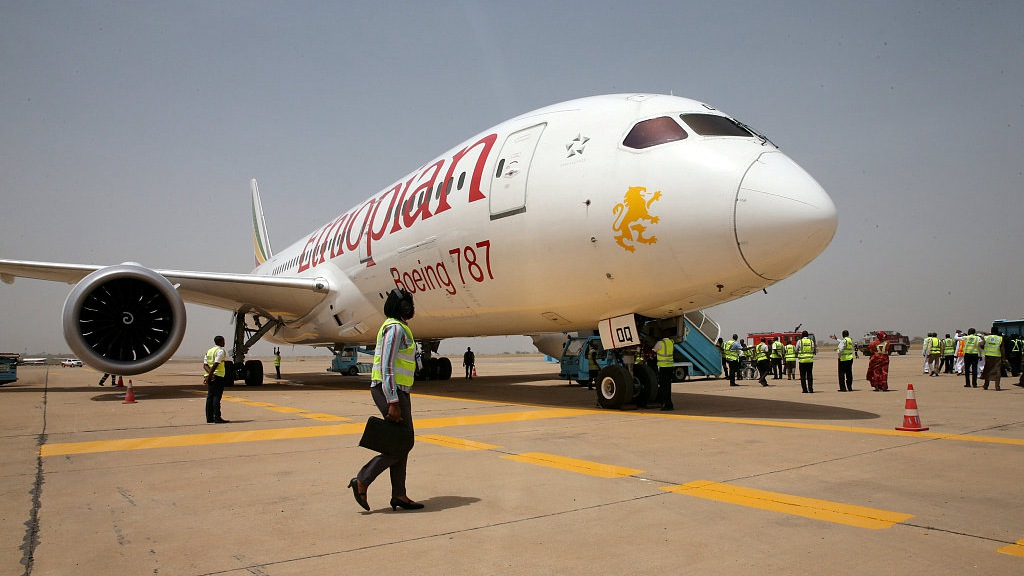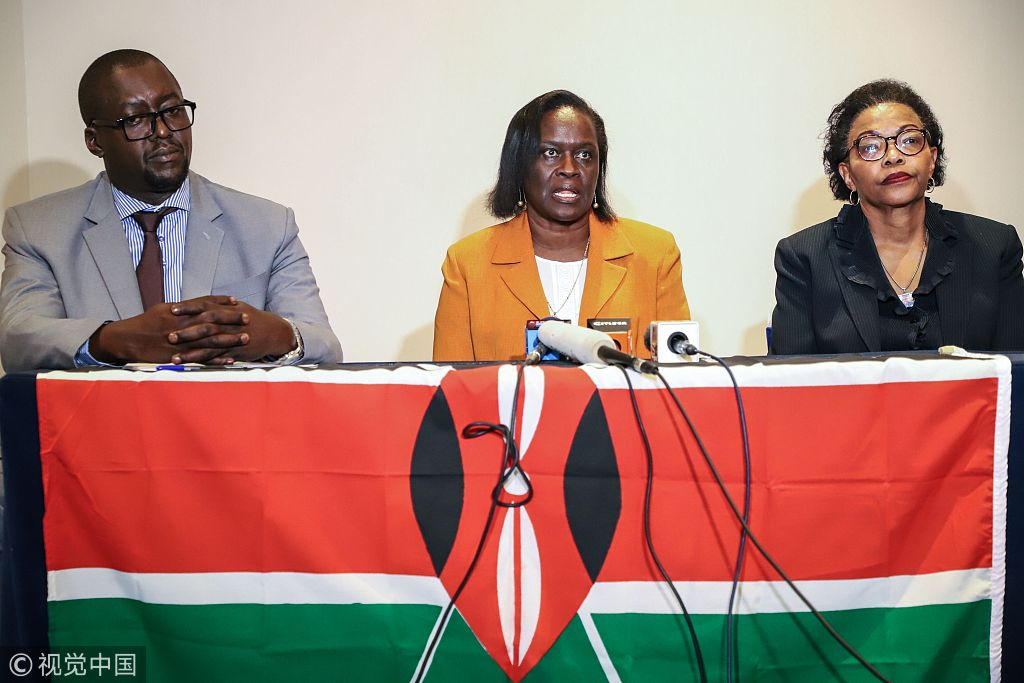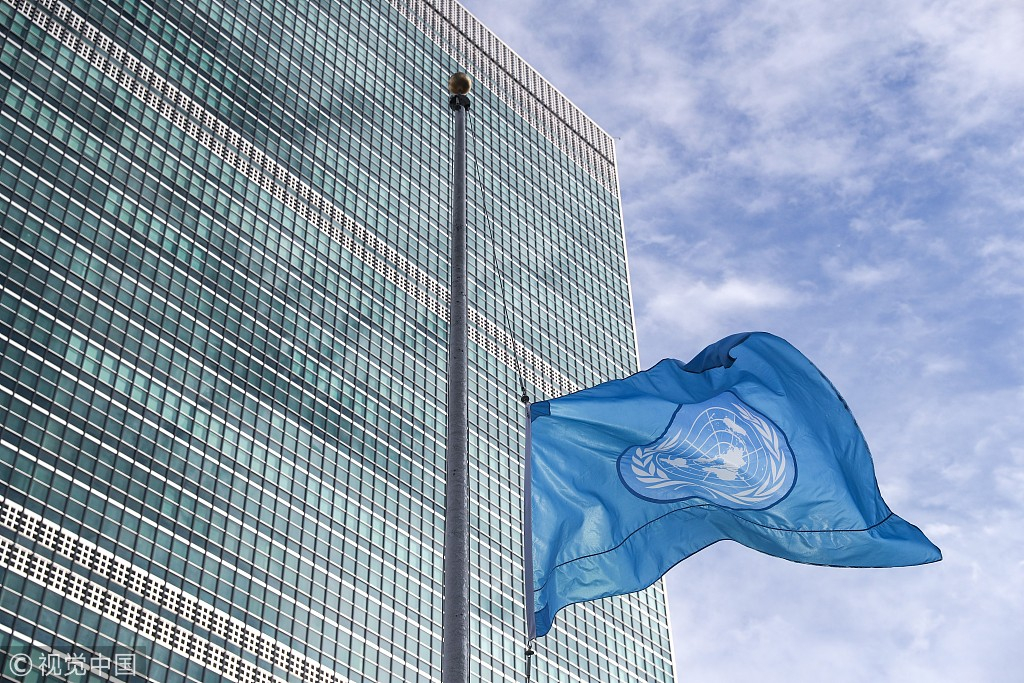
Opinion
09:46, 14-Mar-2019
Opinion: A look at the African aviation industry
Shen Shiwei

Editor's note: Shen Shiwei is a research fellow at the Charhar Institute and former government relations and investment consultant for Chinese enterprises overseas business. He has traveled across Africa via many airlines including Ethiopian Airlines in the past.
On March 10, Ethiopian Airlines flight ET 302 crashed shortly after takeoff, killing all 157 on board. Among the passengers were members of international organizations, with the majority of them sharing a commonality: they lived and worked in Africa.
The crash raises concerns over the safety of African airlines.

Esther Koimett (C), Principal Secretary of Kenya's Ministry of Transport, and Catherine Mwangi (R), Kenya's ambassador to Ethiopia, attend a press conference in Addis Ababa, Ethiopia, March 12, 2019. /VCG Photo
Esther Koimett (C), Principal Secretary of Kenya's Ministry of Transport, and Catherine Mwangi (R), Kenya's ambassador to Ethiopia, attend a press conference in Addis Ababa, Ethiopia, March 12, 2019. /VCG Photo
At present, authorities are paying more attention to aviation issues in the aftermath of the crash. Countries including European Union (EU) nations, the UK, Australia, New Zealand, Morocco, UAE, and India have grounded all Boeing 737 MAX 8 after China, Indonesia, Ethiopia and Singapore first issued the suspension. For aircraft manufacturers, regulatory authorities and airline companies, concrete solutions for aviation safety are top priorities.
They all need to rebuild passengers' confidence. But do we have full confidence in this regard?
I could hardly give a 100 percent guarantee now. Maybe we could choose other cities for transit. But as a frequent traveler across the African continent, I would like to tell my friends that we should need a refreshed image of traveling in Africa first.
In recent years, we have seen a lot of improvements in safety measures and service from African airline companies. More advanced aircraft including Boeing 787 Dreamliner and A350-900XWB have been introduced. Small airlines have been incorporated by giants and have seen better maintenance.
Aviation infrastructure like new airports are being built by international contractors like Chinese companies. Strong cooperation between airlines and major aircraft manufacturers like Boeing, Airbus, Bombardier, and Chinese have all improved in recent years.

The United Nations flag is seen at half mast in memory of the victims of Ethiopian Airlines Flight ET302 plane crash at the UN headquarters in New York, March 11, 2019. /VCG Photo
The United Nations flag is seen at half mast in memory of the victims of Ethiopian Airlines Flight ET302 plane crash at the UN headquarters in New York, March 11, 2019. /VCG Photo
Today, it is very common to travel in Africa by air, with airlines that are either state-owned or privately run. Millions of people travel across this vast continent each year, many of them via Ethiopian Airlines, Kenya Airways or South African Airway, the top three giants in Africa.
The reason is very simple: these airlines cover major capitals and economic hubs across Africa to make the trip more convenient. Also, their better management and reputation gives passengers more confidence.
But now, we have other problems besides technical ones.
Some African airlines companies are facing severe competition from stronger outside competitors like the Emirates and its affiliated Fly Dubai, Turkish Airlines and Qatar Airways. Also, due to the lack of airspace openness and profits, many countries could not allocate enough public funds for aviation industries. That is why local airlines only take a small portion of the African aviation market share.
As this vast continent develops the Single African Air Transport Market which covers more than 50 countries, a huge demand for aircraft, technicians, infrastructure like new airports, training will emerge. But that needs a huge investment in terms of capital, human resources training to policies coordination. It is a big burden for many African airlines, especially those with a poorly managed balance sheets.
It the time for us to take these opportunities to enhance aviation cooperation, especially on safety issues. That would be the best way to rebuild confidence and protect all passengers.
(If you want to contribute and have specific expertise, please contact us at opinions@cgtn.com.)

SITEMAP
Copyright © 2018 CGTN. Beijing ICP prepared NO.16065310-3
Copyright © 2018 CGTN. Beijing ICP prepared NO.16065310-3